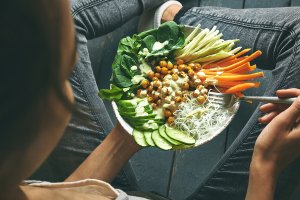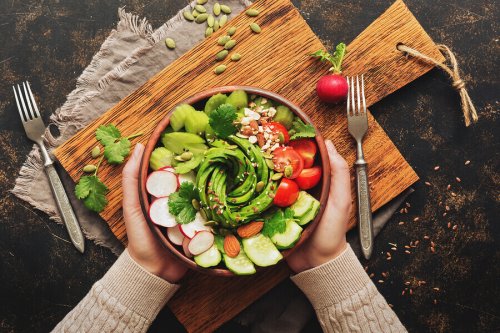Tips to Recover Faster from Exercise on a Vegan Diet

Training routines require physical effort and, of course, produce wear and tear. Given this consumption of energy and the body’s resources, it’s necessary to keep in mind the things we need in order to recover faster from exercise on a vegan diet.
Vegans don’t have to exempt themselves from doing sports due to nutritional reasons. In fact, regardless of the meal regime, you follow, if it’s not perfectly balanced, it produces negative health consequences.
Muscle relaxation: recover faster from exercise on a vegan diet
After intense physical efforts, it’s necessary to know how to relax and eliminate accumulated body tension. Thus, we calm our minds, our fatigued muscles rest, and this relaxation allows us to feel a peaceful sensation. It also relieves body pressure and facilitates the assimilation of effort with less pain. All of this increases our strength and vigor.
The relaxation technique contemplates a series of practices that avoid contractures and ailments by making muscles and joints more flexible. Before and after the exercises, we should stretch our muscles gently to prepare our body properly.
If the training session was strenuous, it’s acceptable to resort to relaxing massages. On the other hand, if there’s swelling, it usually yields after applying ice and alternating with heat to increase the blood flow.
Active rest after exercise on a vegan diet
Active rest involves a series of tactics that constitute a pause to recover energy in order to proceed with other activities. One of them is walking without running, a routine that helps to release the muscles. It’s also a light cardiovascular exercise that allows you to activate your circulation.
Another highly advisable option to accelerate the body’s recovery process after exerting great physical effort is to do breathing exercises. Inhale and exhale slowly, making sure that the air fills up the lungs completely. Doing this makes it possible to distribute oxygen throughout the body, which in turn provides a calming effect.

A night of restful sleep is essential for people of any age who assume a vegan diet and are athletes. Sleeping deeply for a minimum of seven hours fully relaxes the body and prepares the muscles for activity.
Disregarding these guidelines means that the toxins that weren’t eliminated will maintain your body’s tension. This, in turn, can cause negative effects, which can even alter your mood.
Rest and recovery periods don’t imply that people will limit themselves to doing nothing. On the contrary, you require discipline to follow and carry out activities that benefit your body.
These options also include meditation or yoga sessions. After all, the body and mind form a unit that demands a constant renewal of energies.
Adequate hydration: recover faster from exercise on a vegan diet
Water is vital. It’s normal to bring up this idea, but it’s still a great truth; even more so for an athlete. A high percentage of our body weight is H2O. While exercising, you can lose up to 1.5 liters. This occurs mainly through perspiration, which fulfills the primary mission of keeping the body fresh.
To recover quickly from a sports session, it’s essential to hydrate yourself. Drinking water before, during, and after exercise is mandatory, regardless of whether you feel thirsty or not. Remember that dehydration leads to fatigue, cramps, and dizziness.
After exercising on a vegan diet, you can quench your thirst with excellent drinks, such as homemade lemonade and coconut water; which provide essential salts and electrolytes.
Keep in mind that recovering from sports activities is easier with juices that don’t contain sugars since these don’t favor energy compensation. Instead, fructose and stevia are optimal options; in addition to sweetening, they provide the carbohydrates that your muscles require for their restoration.

Appropriate meals for exercising on a vegan diet
Eating properly after sports is crucial to facilitate muscle regeneration. After recovering your liquids, we recommend a strong meal consisting of grains, legumes, and cereals, such as soybeans, chickpeas, potatoes, corn, oats, or wheat.
All these options are ingredients that provide the necessary proteins for a faster and more efficient recovery. Don’t forget that you can carry out a vegan diet and still gain weight. The key point is to choose the right foods.
One aspect that we should point out is the role of vitamins and minerals that are found in vegetables like broccoli. The same goes for some fruits, especially citrus fruits. The latter also facilitate the assimilation of iron by hemoglobin, responsible for oxygenating the cells and muscle regeneration.
Training routines require physical effort and, of course, produce wear and tear. Given this consumption of energy and the body’s resources, it’s necessary to keep in mind the things we need in order to recover faster from exercise on a vegan diet.
Vegans don’t have to exempt themselves from doing sports due to nutritional reasons. In fact, regardless of the meal regime, you follow, if it’s not perfectly balanced, it produces negative health consequences.
Muscle relaxation: recover faster from exercise on a vegan diet
After intense physical efforts, it’s necessary to know how to relax and eliminate accumulated body tension. Thus, we calm our minds, our fatigued muscles rest, and this relaxation allows us to feel a peaceful sensation. It also relieves body pressure and facilitates the assimilation of effort with less pain. All of this increases our strength and vigor.
The relaxation technique contemplates a series of practices that avoid contractures and ailments by making muscles and joints more flexible. Before and after the exercises, we should stretch our muscles gently to prepare our body properly.
If the training session was strenuous, it’s acceptable to resort to relaxing massages. On the other hand, if there’s swelling, it usually yields after applying ice and alternating with heat to increase the blood flow.
Active rest after exercise on a vegan diet
Active rest involves a series of tactics that constitute a pause to recover energy in order to proceed with other activities. One of them is walking without running, a routine that helps to release the muscles. It’s also a light cardiovascular exercise that allows you to activate your circulation.
Another highly advisable option to accelerate the body’s recovery process after exerting great physical effort is to do breathing exercises. Inhale and exhale slowly, making sure that the air fills up the lungs completely. Doing this makes it possible to distribute oxygen throughout the body, which in turn provides a calming effect.

A night of restful sleep is essential for people of any age who assume a vegan diet and are athletes. Sleeping deeply for a minimum of seven hours fully relaxes the body and prepares the muscles for activity.
Disregarding these guidelines means that the toxins that weren’t eliminated will maintain your body’s tension. This, in turn, can cause negative effects, which can even alter your mood.
Rest and recovery periods don’t imply that people will limit themselves to doing nothing. On the contrary, you require discipline to follow and carry out activities that benefit your body.
These options also include meditation or yoga sessions. After all, the body and mind form a unit that demands a constant renewal of energies.
Adequate hydration: recover faster from exercise on a vegan diet
Water is vital. It’s normal to bring up this idea, but it’s still a great truth; even more so for an athlete. A high percentage of our body weight is H2O. While exercising, you can lose up to 1.5 liters. This occurs mainly through perspiration, which fulfills the primary mission of keeping the body fresh.
To recover quickly from a sports session, it’s essential to hydrate yourself. Drinking water before, during, and after exercise is mandatory, regardless of whether you feel thirsty or not. Remember that dehydration leads to fatigue, cramps, and dizziness.
After exercising on a vegan diet, you can quench your thirst with excellent drinks, such as homemade lemonade and coconut water; which provide essential salts and electrolytes.
Keep in mind that recovering from sports activities is easier with juices that don’t contain sugars since these don’t favor energy compensation. Instead, fructose and stevia are optimal options; in addition to sweetening, they provide the carbohydrates that your muscles require for their restoration.

Appropriate meals for exercising on a vegan diet
Eating properly after sports is crucial to facilitate muscle regeneration. After recovering your liquids, we recommend a strong meal consisting of grains, legumes, and cereals, such as soybeans, chickpeas, potatoes, corn, oats, or wheat.
All these options are ingredients that provide the necessary proteins for a faster and more efficient recovery. Don’t forget that you can carry out a vegan diet and still gain weight. The key point is to choose the right foods.
One aspect that we should point out is the role of vitamins and minerals that are found in vegetables like broccoli. The same goes for some fruits, especially citrus fruits. The latter also facilitate the assimilation of iron by hemoglobin, responsible for oxygenating the cells and muscle regeneration.
All cited sources were thoroughly reviewed by our team to ensure their quality, reliability, currency, and validity. The bibliography of this article was considered reliable and of academic or scientific accuracy.
- Patricia Jáuregui. Dietas vegetarianas en adolescentes deportistas. 2016. Extraído de: https://www.sap.org.ar/docs/Congresos2016/2016Mes6%20Deporte%20PDFs/Jauregui_Dietas%20Vegetarianas.pdf
- Fátima Torres Flores; Fernando Mata Ordoñez. 2009. Dieta vegetariana y rendimiento deportivo. Extraído de: https://emasf.webcindario.com/Dieta_vegetariana_y_rendimiento_deportivo.pdf
This text is provided for informational purposes only and does not replace consultation with a professional. If in doubt, consult your specialist.








